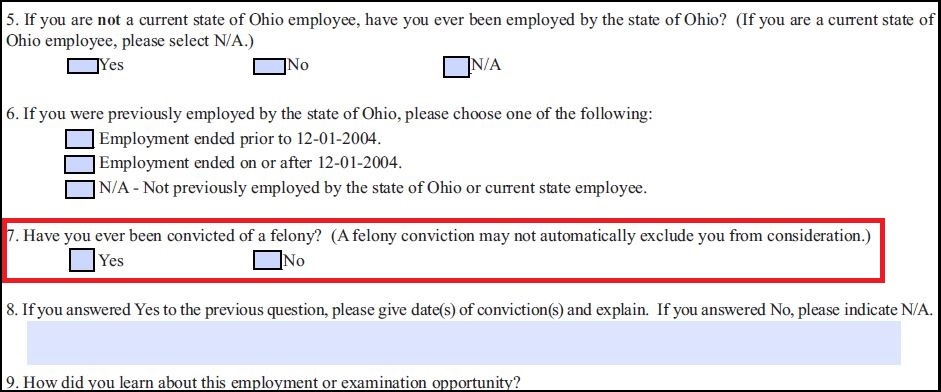Ohio HB 56 Targets Felon Hiring Bias
Ohio’s House Bill 56 targets felon hiring bias during the job application process. The bipartisan legislation “bans the box” by making it illegal to ask applicants to identify their criminal record when initially completing an employment application. “Ban the Box” legislation, as it is called, has been enacted in over 13 States.

House Bill 56 hopes to eliminate questions like this one found on the Ohio Civil Service Application.
Currently many ex-inmate applications are immediately trashed after indicating they are a convicted felon. By eliminating the question on State employment applications, the bill’s authors hope those with a felony conviction will get further in the interview process allowing employers to better judge their capabilities before making a decision. The bill does not prohibit employers from performing a background check prior to making an offer, it only eliminates the initial prejudice that may occur when the application is first submitted.
House Bill 56 will help 1 in 6 Ohioans (about 1.9 million people) with misdemeanor or felony records find employment with public employers.
The problem facing current felons is the general bias by employers who will not risk hiring a felon. People convicted of a crime, “do their time” then continue to be punished long after leaving prison through low employment prospects.
Many employers fear litigation from hiring a known felon, but protection is available to reduce or eliminate this concern. The Federal Bonding Program offers a $5,000 fidelity bond protecting businesses that fire felons. In addition there is a $2,400 per employee Work Opportunity Tax Credit available to employers who hire a felon.
Helping to authenticate a former inmates suitability for employment, the Ohio Department of Rehabilitation and Correction offers Certificates of Qualification for Employment as well as Certificates of Achievement and Employability. These documents help protect an employer by offering a basic level of assure about the felon.
House Bill 56 is very limited in scope, but offers a good first step in helping convicted felons integrate back into society after serving their time and paying their dues.

